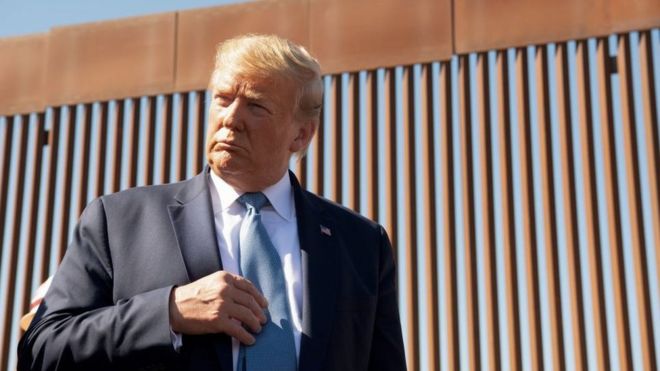Trump Denies Promise to Foreign Leader

Donald Trump
has denied a report alleging he made a promise to a foreign leader, which
sparked a whistleblower's formal complaint.
The complaint
is reported to relate to a July phone call with Ukraine's new president,
Volodymyr Zelensky.
The
Washington Post said an intelligence official found the comment "so
troubling" they went to the department's inspector general.
In a tweet,
Mr Trump dismissed the claims as "fake news".
Democrats
are trying to get the complaint turned over to Congress, with the details still
unknown.
However,
some reports allege that Mr Trump asked Mr Zelensky to investigate Joe Biden
and his son Hunter - who previously served on the board of a Ukrainian gas
company - in return for continued US military support.
Joe Biden is
currently the frontrunner to be the Democratic candidate competing against Mr
Trump in the 2020 presidential election.
It was filed
on 12 August and only a few details have been made public.
Intelligence
Community Inspector General Michael Atkinson said the complaint consists
of a "serious or flagrant problem, abuse or violation of the law" that
involves classified information, a letter to lawmakers revealed.
It is not
yet known who made the complaint, which foreign leader Mr Trump was speaking
to, what promise - if any - was made and whether Mr Trump took any action as a
result.
However, the
Washington Post and the New York Times both said at least part
of the complaint related to Ukraine, citing officials with knowledge of the
matter.
The acting
director of national intelligence, Joseph Maguire, has so far refused to share
any details of the complaint with lawmakers, leading to an outcry among
Democrats.
Under US law,
if the complaint is considered to be of "urgent concern", and if the
inspector general considers the complaint to be "credible", then the
department head is expected to share the information with Congress within seven
days.
Earlier this
month, before the whistleblower's complaint came to light, House Democrats
launched an investigation into Mr Trump and his lawyer Rudy Giuliani's
interactions with Ukraine.
Three
Democratic panel heads - Eliot Engel (foreign affairs), Adam Schiff
(intelligence) and Elijah Cummings (oversight) - said Mr Trump and Mr Giuliani
had attempted "to manipulate the Ukrainian justice system to benefit the
president's re-election campaign and target a possible political
opponent".
They allege
that Mr Trump and Mr Giuliani tried to pressure the Ukrainian government into
investigating Joe and Hunter Biden.
Mr Trump and
President Zelensky had a phone call on 25 July, two and a half weeks before the
complaint was filed.
The two
leaders will hold talks next week in New York, where Mr Zelensky will be
attending the UN General Assembly, his office said.

No-one in
Ukraine's presidential administration wants to talk about the 25 July phone
call between Mr Trump and Mr Zelensky, or respond to the claims that Mr Trump
asked Ukraine to investigate his possible opponent in 2020 in return for
continued US military support. There are a few circumstantial clues.
Firstly, the
Ukrainian readout of the call refers to Mr Trump being
"convinced" that the new government will "complete (the)
investigation of corruption cases, which inhibited the interaction between
Ukraine and the USA".
Is that a
diplomatic reference to the US president asking for a probe into Mr Biden?
There's then
the question as to why President Trump has kept Ukraine's new leader at arms'
length since his election in April.
Some $250m
in US military assistance for Ukraine was mysteriously held up by the White
House this summer, and a long-mooted visit for President Zelensky to Washington
has still not materialised.
On Thursday
afternoon, Mr Trump wrote on Twitter that he knew all his phone calls to
foreign leaders were listened to by US agencies.
"Knowing
all of this, is anybody dumb enough to believe that I would say something
inappropriate with a foreign leader," he asked.
On Friday,
Mr Trump tweeted that the conversation was "perfectly fine and
respectful", without providing more details about who he spoke to. He also
said the statement from the whistleblower was "highly partisan".
Meanwhile, Mr
Giuliani gave an interview to CNN where he both confirmed, and denied,
that he had asked Ukraine to investigate Joe Biden.
He explained
the contradiction by saying that he had asked Ukraine "to look into the
allegations that related to my client, which tangentially involved Joe Biden in
a massive bribery scheme".
He also
wrote on Twitter that "a President telling a Pres-elect of a well
known corrupt country he better investigate corruption that affects US is doing
his job".
Mr Trump and
his fellow Republicans have questioned whether it represented a conflict of
interest that Hunter Biden had served on the board of Burisma, a Ukrainian gas
company.
In May,
Ukraine's prosecutor general said there was no evidence of wrongdoing by Joe or
Hunter Biden.
There is a
disagreement between the acting director of national intelligence (DNI), Joseph
Macguire, and Inspector General Michael Atkinson, who is responsible for
conducting independent audits and investigations across the intelligence
community.
A lawyer for
Mr Macguire's office said in a letter to lawmakers that the complaint
"does not meet the definition of urgent concern".
The
complaint "concerned conduct by someone outside the intelligence community
and did not relate to any 'intelligence activity' under the DNI's
supervision", the letter said.
It also
involved "potentially privileged matters", the letter added.
Mr Atkinson
told lawmakers in a letter that he disagreed with the DNI's assessment,
and believed the complaint "relates to one of the most significant and
important of the DNI's responsibilities to the American people".
However, Mr
Atkinson added that he was bound by the acting director of national
intelligence's decision.

No comments